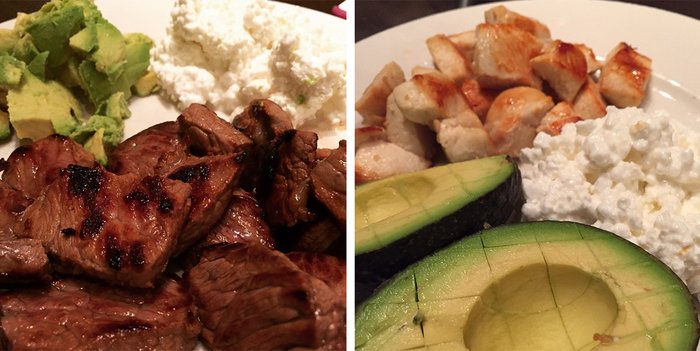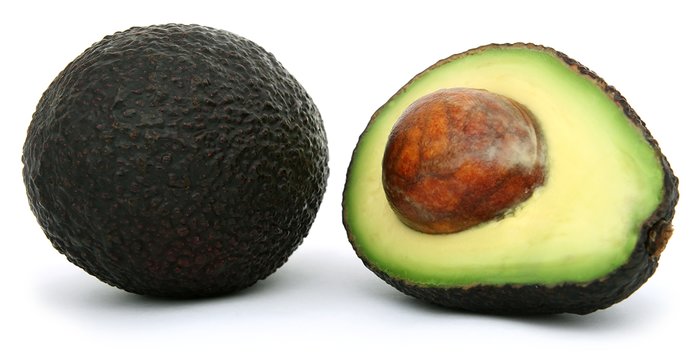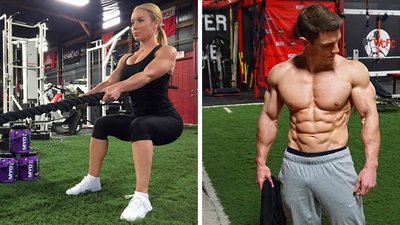Are you one of the millions of Americans who made a resolution to lose weight this year? If you've faithfully pursued that aim through January, congratulations—you're among an estimated 60 percent of resolutioners who stuck with it that long.
By the six-month mark, less than half of these will still be on board. One particularly depressing study puts the ultimate success rate at 8 percent.
So what makes that 8 percent succeed where millions have failed? They do a lot of the right things, of course, but they also keep their defense systems ready for a small number of time-honored enemies of their goals.
We've tapped two trainers who have built their own high-performance bodies and inspired others to do the same: fitness model Jason Wittrock and IFBB Bikini pro Annie Parker. These EAS athletes know how to lose weight without losing your sanity.
Here are the mistakes that will stop too many hopeful people in their tracks.
Mistake 1: Skipping Meals
When fat loss is the goal, it can be easy to get into a mindset where skipping a meal is the solution to your problems. Ate something questionable last night? Skip a meal as punishment. Don't feel really hungry? Don't bother with lunch. After all, it'll help keep calories nice and low, right?
This can be a dangerous path to go down. "When you skip a meal, it sets off a chain of adverse effects," Parker explains. "Your blood sugar drops, your metabolism slows down, and you often end up overeating at your next meal."
The consequences of skipping a meal here and there aren't as severe, but chronic meal skipping can leave you with low energy levels and a harder time keeping the weight off.
Wittrock agrees. "Over time, undereating causes metabolic damage and leads to unnecessary stress on your mind and body. It can also disrupt your body's normal hormonal response, which can lead to a slower metabolism and a loss of muscle mass. Unless you are stranded on a desert island, weight loss by undereating is almost impossible to maintain."
Instead of trying to starve yourself lean, Wittrock recommends focusing on eating clean, whole foods and good carbs like green leafy vegetables.

Instead of trying to starve yourself lean, Wittrock recommends focusing on eating clean, whole foods.
The solution: Eat every 3-4 hours when training hard.
That may sound like a lot, but keep in mind, a "meal" can be everything from a snack to your traditional breakfast, lunch and dinner.
Mistake 2: Overdoing Fast-Digesting Carbs
There's so much focus on how much we eat these days that it's easy to overlook the importance of what we eat. And when fat loss is the goal, you need to get serious about how you choose your carb sources.
So-called "simple" carbohydrates cause a spike in blood glucose (i.e., blood sugar), which in turn causes your body to secrete the hormone insulin. "Insulin regulates fat accumulation and is responsible for ushering glucose into cells," Wittrock says. "Insulin in your bloodstream also discourages fatty acids from leaving the fat cells."
Learn to recognize and separate the "bad" carbs from the good. "If you're trying to lose fat, avoid table sugar and high-fructose corn syrup, as well as liquid carbs like soda, fruit juice, beer, wine, and sports drinks," Wittrock suggests. "At most meals, you should also steer clear of refined grains like bread, pasta, white rice, baked goods, and cereal, as well as starches like potatoes, rice, and corn."

Learn to recognize and separate the "bad" carbs from the good.
As you may have heard, there is one time during the day where fast-acting carbs can help you: right after workouts. At this time, nudging up insulin levels helps shuttle the amino acids in protein (which you should also be ingesting after workouts) to muscle cells to facilitate repair.
Of course, many people these days advocate cutting all carbs, not just fast-digesting ones. Parker and Wittrock aren't among them. "You shouldn't be afraid of carbs—the right ones," Parker says. "Carbs are energy and fuel for the brain, which is why when you're low-carb, you can't think straight. You don't have to avoid these to lose fat."
The solution: Be systematic about your carbs.
Eat slow-digesting carbs at meals and snacks. Post-workout, take 25-40 grams of protein with 60-80 grams of carbs within an hour or so of your last rep.
Low-Glycemic Carb List
- Nuts
- Legumes
- Dairy (unsweetened)
- Low-GI fruits like berries and citrus fruits
- Brown rice and other whole grains
- Sweet potato or yam
- Oats
- Vegetables (except starches or corn)

Mistake 3: Going Low-Fat
"It's becoming clearer every day that eating fat doesn't necessarily make you fat—excess carbs and sugars do," Wittrock explains. "So when reducing your intake of fast-digesting carbohydrates, it makes sense to replace missing calories not only with protein, but also with healthy fats."
Too often, butter is the face of fats. It can have a place at your table, but put your focus more on healthy oils, avocado, eggs, cheese, nuts, and of course, fatty fish. Just don't make the mistake the last generation did and reach for the margarine, which often contains trans fats. "This is the artificial, man-made fat," Wittrock says. "Avoid it at all costs. While they're derived from naturally occurring fats, trans fats were engineered industrially about six decades ago and expanded to use in margarines, snack foods, packaged baked goods, and in the frying of fast foods.
You've no doubt eaten your share at some point, but hopefully those days will soon be behind all of us. The good news is that the Food and Drug Administration is moving ahead with a ban on artificial trans fats in the food supply, but that process will take at least three years. Meanwhile, watch your labels for hydrogenated vegetable oil or partially hydrogenated vegetable oil, and opt for fresh ingredients in your diet whenever possible.

Put your focus more on healthy oils, avocado, eggs, cheese, nuts, and of course, fatty fish.
The solution: Know your fats like you know your carbs.
Get enough fat from the right sources, and none from the wrong ones—those that (not coincidentally) also usually contain other trashy ingredients whose consumption impedes fat loss.
Mistake 4: Cutting Your Water Intake
When readying for a show, bodybuilders often toy with water consumption, sometimes cutting precious H2O out almost completely at certain points in the days before stepping onstage.
That's a short-term strategy for a very specific competitive event, not a way to look good for a selfie or prepare for a weekly weigh-in. And you can bet that before the ink has dried on the scorecards, those athletes are backstage rehydrating.
"Water is essential for proper organ functioning, healthy skin and nails, and as a transporter for healthy nutrients into and out of your cells," Wittrock points out. "If anything, it's more important to be adequately hydrated when you're looking to lose weight."
Another great thing about water? It's the original "detox"—and a far better one than anything else on the market. "Water is what flushes out any toxins from our bodies. And where do toxins otherwise get stored? In places like fat cells," Parker adds.
The solution: Drink up.
Water is, and always has been, the best thing you can drink. Aim to consume half an ounce of fluids per pound of body weight per day, and make plain water a large percentage of those fluids. Add even more fluids based on your workouts.
Mistake 5: Letting A Sweet Tooth Rule Your Mind
Maybe this would be sin number one for a lot of you. It's an obvious "don't," but in practice, it's brutally difficult.
"As someone with the sweet tooth of a 3-year-old, I can say that actually following this advice is one of the hardest things to do," Parker admits. "Sugar is one of the most enticing things in the world. The more you have, the more you seem to want. And it's in so many of our foods, making it incredibly challenging to avoid."

While some people advocate a selective cheating strategy to deter binges, some dieters find this only heightens their unquenchable desire for bad foods. The constant reminder of that flavor makes them yearn for it more and more. Without any sustained mental or physical separation from those foods, they remain implanted in our brains.
If that sounds like a recipe for becoming another New Year statistic, you're right!
The solution: Don't start "cheating" until you've tried changing.
Cheat meals get lots of attention, but long-term fitness enthusiasts have discovered a different option that wipes the palate clean and can help reset the types of foods you seek out. "Try to go two weeks totally sugar-free, and those hardcore sugar cravings may start to wane," Parker says. "Then, foods with natural sugar, like berries, will start tasting sweeter to you."
Mistake 6: Getting Comfortable With Your Cardio
In bodybuilding, it's been often said that everything works, but nothing works forever. This is why lifters regularly manipulate things like rest periods, rep ranges, and even the time it takes to move a load up and down for individual lifts.
And then, when it comes time to do cardio, those same people will just mount the same machine and do the same old cardio every time for years on end. Huh?
"It's amazing how well the human body adapts to certain conditions." Parker says. "It's true for both your strength and cardio routines. For example, if you're doing the same cardio day after day, your body probably isn't optimally burning calories from it anymore. Switching things up may kick things into high gear again."
Just a warning: Alternating among activities like rowing, pick-up basketball, the stairmill, dumbbell circuits, and HIIT jump-rope intervals will be tougher—way tougher—than doing just one of those things over and over again. But it will also burn way more calories. That's the point, right?
The solution: Mix it up!
If you're preparing for a specific event like a powerlifting meet, then of course you need to do the same thing over and over again. But if fat loss is the goal, variety will help you get there. Keep changing it up, and you'll keep progressing!

Mistake 7: Feeling Overwhelmed And Letting That Feeling Take Over
"This is one of the biggest issues in weight loss," Parker contends. "Many of us already have too much everyday stress raising our cortisol levels. The stress that you put on yourself after cheating on your diet or missing a workout only makes things worse. Consistently elevated cortisol can and will make it extremely difficult to lose fat."
Both athletes insist that patience is key. Be proud of yourself for making the decision to lose weight and take control of your life. "Ask yourself why you want to lose weight," Wittrock says. "Then, every time you face adversity along the way, remind yourself why you started. Surround yourself with positive people, and find new friends in your community and on Bodybuilding.com who are after the same goals. Finally, as you grow successful in your weight loss, pay if forward by encouraging other people on their journey."
The solution: Build resiliency as seriously as you build muscle.
Make no mistake, willpower is a skill that must be nurtured like any other. Don't expect it to appear in your life by magic. "Often, when people stress about messing up on their nutrition or fitness plan, they take it as a sign to throw in the towel," Parker says. "The truth is, the answer is always just to get back up and try again."

